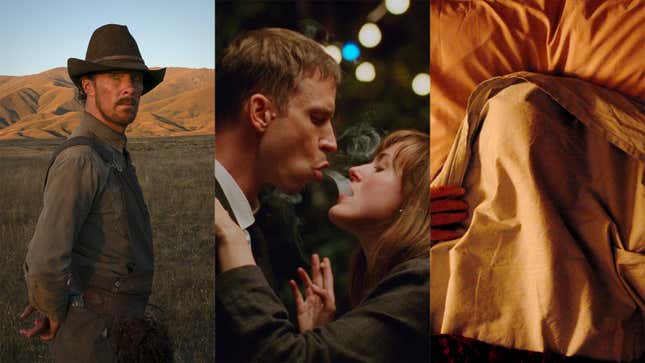Some Upcoming Movies To Be Excited for, Courtesy of the New York Film Festival
This year's slate is teeming with strong entries from the likes of Jane Campion, Joachim Trier, and Gaspar Noé
EntertainmentMovies
Image: Netflix/NEON/Wild Bunch Distribution (all via Film at Lincoln Center)
It would be callous and inaccurate to say that this year’s New York Film Festival offerings have ADHD arthouse vibes, but there is a palpable sense of dynamism within many of the slate’s films. A grifter nun who enjoys lesbian sex during the time of a global pandemic? Check. A serial killer whose desperate attempt to disguise herself prods issues of transformation and chosen family? Check. Besides those two movies (already covered by Jezebel: Paul Verhoeven’s Benedetta and Julia Ducournau’s Titane), there’s a stunning Western from Jane Campion, which gets under the genre’s skin with the precision of an X-ray. There’s a Norwegian romcom, The Worst Person in the World, chopped up into 12 chapters (and epilogue/prologue) which are often self-contained formal exercises. There’s a movie about dying, Gaspar Noe’s Vortex, which presents a split-screen (one side for each protagonist) throughout. And then there is Apichatpong Weerasethakul’s latest, as logic-twisting and beguiling as a dream itself.
Capsule reviews of four notable new films playing at this year’s fest follow.
The Power of the Dog
Jane Campion’s adaptation of Thomas Savage’s 1967 novel of the same name goes where few Westerns do, simply by taking a look under the genre’s hood. All that macho stuff, the homosocial atmosphere, the inherent physicality? That doesn’t look very different from what could be deemed “actually kinda gay” in a more contemporary context. Campion understands that because masculinity is the norm, it is if not defined then certainly affirmed by that which deviates from it. The ostensible deviant in this story, set in 1925 Montana, is Peter (Kodi Smit-McPhee), a soft young man who is perhaps on the spectrum (his stimming behavior suggests as much), who finds himself in the crosshairs of Phil (a never-been-better Benedict Cumberbatch). The cowboy patronizes the restaurant of Peter’s mother Rose (Kirsten Dunst) and immediately starts mocking Peter, a server there, whom Phil openly wishes would “snap out of it and get human.” After Phil’s brother George (Jesse Plemons) approaches Rose to apologize, they enter a relationship (yes, real-life spouses Dunst and Plemons once again play onscreen spouses, as they did in the TV series Fargo). This brings Rose in regular close proximity to Phil, whose bravado terrorizes her, as well as Peter, who seems keen to learn his oppressor’s ways. The term “toxic masculinity” has been thrown around a lot already in reference to this movie, but in my estimation, this masculinity is actually more virulent than anything.-

-

-

-

-

-

-

-

-

-

-

-

-

-

-

-

-

-

-

-

-

-

-

-

-

-

-

-

-

-

-

-

-

-

-

-

-

-

-

-








































